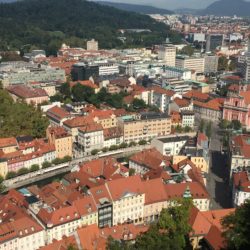
Ljubljana is the epitome of picture-postcard beauty. Between the bridges spanning the tree-lined banks of the Ljubljanica River and Ljubljana Castle looking down on Prešernov trg, well you’d be forgiven if you thought you wandered onto a fairy tale movie set. All of this makes Metelkova, a small, self-declared autonomous cultural “city” in the northeast corner of Ljubljana, a surprising delight.
I had originally wandered over to that part of the city to check out the Ethnographic Museum, which I found dull and easily missable. Luckily, as I exited the museum some graffiti caught my eye and I decided to get a closer look.

What I stumbled upon ended up being one of the coolest and most eye-catching places I visited on my travels. Metelkova’s origin story is as interesting as the commune that exists today: the buildings were military barracks built in Austro-Hungarian times, that were later occupied by Nazi Germany and then finally by the Yugoslav National Army (JNA). By early 1990, Slovenia had officially changed its name to the Republic of Slovenia and held its first democratic elections. On June 25, 1991, Slovenia declared its independence from Yugoslavia and on June 27 entered into a 10-day war with JNA troops. By the end of July 1991, all JNA had left Slovenia and the barracks were empty and abandoned.
Some students and artists attempted to petition the city for control of the former barracks, but failed. In 1993 they decided to just start squatting in the buildings and they have been there ever since. They are connected to city utilities like power and water, which are paid for by the profits from bars and art galleries in the commune, but otherwise they pay no taxes or rent on the buildings and are able to serve liquor without a license. Rather than fighting the art colony, Ljubljana named Metelkova a “national cultural heritage site” in 2006, which afforded it several protections.

Nowadays Metelkova is the center of the alternative and LGBT scenes in Ljubljana. Klub Tiffany is the biggest gay club, which is open Tuesday and Thursday-Saturday from 11pm to 5am. (Sadly a little too late for me, ha, but a decade earlier and I would have been there!) Other venues play punk, hard rock, jazz, techno- you name it and you can find it there.
You are free to wander around and take photos of the buildings, but there is a sign that warns not to take pictures of people- this is not a zoo!





It’s not lost on anyone that a military prison and barracks used by Nazis and the JNA is now a liberal utopia for artists and gay people that its former occupants would have loved to stamp out. My dad sometimes likes to say “it is what it is,” but Metelkova is proof that anything can change and be what you make of it. “It is what it is” is the surest way of giving up. Well, this situation sucks, but it is what is and there’s nothing anyone can do about it. Wrong. We must believe that way of thinking is always wrong, and travel is the ultimate method to facilitate an anti-it-is what-it-is philosophy. So it might sound a little corny, but try traveling with a bit of Metelkova’s spirit in you and you’ll be surprised how you’ll view the world in a new light.
